
Chemotherapy cancer treatment
Chemotherapy is medicine used to destroy cancer cells throughout your body. It can be given by injection, mouth (oral), or intravenous (IV) line. It can also be given through an implanted port or central line. There are many different types of chemotherapy. You and your medical oncologist will decide which type of medicine is right for you.
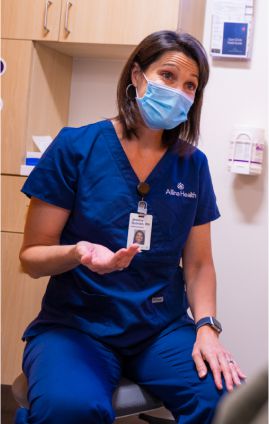
What to expect during chemotherapy
- When you arrive, the infusion nurse will review your treatment plan and take a set of vital signs and a weight. Labs will be drawn, if needed.
- When you are ready to receive treatment, the nurse will let the pharmacy know to prepare the medicine. Once it is ready, two nurses will double check the medicine and start your treatment.
- There may be a wait while the pharmacy gets your lab results and prepares your medicine.
- You will sit in a comfortable chair such as a recliner.
- You will have an IV line started. This will be used to give you fluids and medicines, including chemotherapy.
- During your treatment, you can watch TV, read, rest, or visit with a family member or friend.
- Each treatment can vary in length. Some can last several hours.
- When the treatment is done, the IV will be stopped and it may be removed.
- The nurse will then make sure you have been scheduled for any follow-up appointments.
- You will be able to go home. You may want to rest after your treatment.
How to manage side effects of chemotherapy
Chemotherapy may have side effects. The most common side effect is fatigue (tiredness). Other common side effects include mouth sores, nausea and hair loss. Everyone reacts differently to chemotherapy. It is common to think that you will have all the side effects or a lot of them, but for most people, this is not common. Learn more about how to care for yourself after chemotherapy.
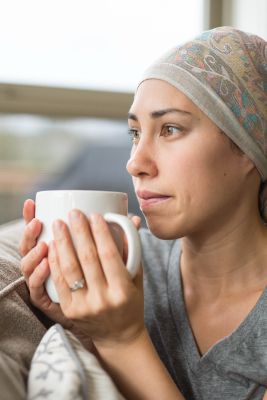
Length of treatment
Each person’s treatment plan will be different. How often and how long you will need chemotherapy depends on the type, grade and stage of your cancer, the goal of your treatment, the type of chemotherapy used, and how your body reacts to chemotherapy. You and your medical oncologist will work together to create a treatment plan that is right for you.
Common chemotherapy treatment questions and answers
Chemotherapy is a cancer treatment that uses powerful medicines to destroy cancer cells, control their growth or relieve symptoms such as pain. Your treatment may involve a single medicine or a combination of medicines.
Your comfort during treatment is important to us. We’re here to help you with the stress, anxiety, or nausea that can come from treatment. Aromatherapy, warm blankets, and games are just some of these comfort items. We also offer snacks, sweets, and beverages during your treatment. For treatments lasting more than three hours, hot meals are available from our kitchen.
Fatigue is a feeling of tiredness that can keep you from doing the things you normally do or want to do. This is one of the most common side effects of chemotherapy. Here are some ways to help manage fatigue:
- Plan your day so that you have time to rest.
- Take several short naps instead of one, long rest period.
- Pace your activities around your energy level.
- Take short walks or do light exercise once a day if you can.
- Try easier or shorter versions of activities you enjoy.
- Try less strenuous activities, like reading or visiting with friends and family.
- Save your energy for those activities that are most important to you.
- Do activities that you enjoy or make you feel good.
- Eat a well-balanced diet if possible and drink plenty of liquids.
- Avoid caffeine and alcohol.
Chemotherapy may cause nausea (upset stomach) and vomiting (throwing up) because it affects the stomach lining and the part of the brain that controls vomiting. The amount of nausea and vomiting a person has varies from person to person.
Nausea and vomiting can usually be controlled with medicine. You can also help manage nausea and vomiting by:
- eating smaller meals more often
- eating bland foods and liquids such as crackers, toast, white rice or yogurt
- drinking more liquids—clear liquids such as water, ginger ale, fruit juices—try Popsicles®, Jell-O®, ice chips and sport drinks
- avoiding fried, fatty, greasy or spicy foods
Chemotherapy can increase your risk of getting an infection. Here are some ways to help prevent getting an infection:
- Hand washing is the most important way to prevent spreading an infection. Wash your hands often with warm, soapy water for at least 20 seconds. You should wash your hands:
- before preparing or eating food
- before touching your eyes, nose or mouth
- after using the restroom
- after blowing your nose, coughing or sneezing
- after touching clinic surfaces such as an exam table, desk, doorknob or chair.
- Avoid visiting family and friends who are sick
- Do not clean the cat’s litter box or handle any animal waste.
- Be sure to wash all fresh fruits and vegetables.
- Do not eat raw seafood or meat cooked rare.
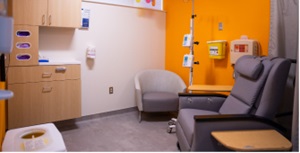
Tour an infusion center
You will get a tour as part of learning about your upcoming chemotherapy treatment.
Comfort menu during chemotherapy
To help pass the time during your treatment, you can bring items such as books, knitting, cards, a laptop or a comfort item. You may also bring a family member or friend. Our infusion centers also provide a variety of comfort items that you can use during your treatment such as games and coloring books and markers. Each infusion center provides their own unique comfort menu. Below are some items you might find on a comfort menu.
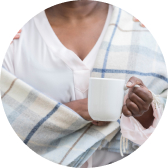
Comfort items
Aromatherapy, warm blankets, and Sea-Bands® for nausea are available to keep you comfortable during your treatment.
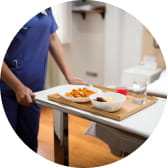
Food and beverages
Snacks, sweets and beverages are available during your visit. For longer treatments, hot meals are available from our kitchen.

Relaxation
Ask your nurse or nurse navigator about scheduling services such as acupuncture, aromatherapy and light massage
Learn more about the infusion centers and our comfort menu offerings.
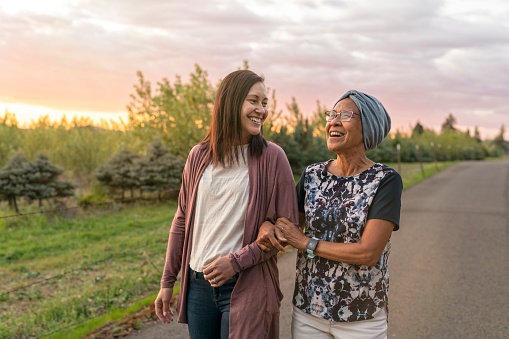
How to support your loved one when they have cancer
The diagnosis of cancer in a loved one can be scary—oftentimes as scary for those who love the person who got a cancer diagnosis, as for the person facing cancer. There are lots of things the cancer patient's close inner circle can do to make their cancer journey an easier one.
Know what to expect
A cancer diagnosis can change your life in an instant. It’s natural to feel overwhelmed, confused or anxious about what to do next. That’s why we make it easy to find the information and resources you need at this difficult time.